- Home
- Joanne Harris
Blueeyedboy Page 16
Blueeyedboy Read online
Page 16
There was constant traffic at the Fireplace House. Students (of course); colleagues; admirers; vagrants on the scrounge for a bite to eat and a cup of tea. Everyone was welcome, as long as they behaved themselves; and as far as I knew, no one had ever abused Dr Peacock’s good nature, or caused him any embarrassment.
It was the kind of house where there is something for everyone. There was always a bottle of wine to hand, and a pot of tea standing on the hearth. There was food, too: usually bread and some kind of soup, several fat fruitcakes weighted with plums and brandy, and an enormous barrel of biscuits. There were several cats, a dog called Patch, and a rabbit that slept in a basket under the parlour window.
In the Fireplace House, time stood still. There was no television, no radio, no newspapers or magazines. There were gramophones in every room like great open lilies with tongues of brass; there were shelves and cupboards of records, some small, some as wide as serving dishes, scored close with ancient voices and yawning, scratchy, vinegary strings. There were marbles and bronzes on wobbly tables; strings of jet beads; powder compacts half-filled with fragrant dust; books with autumn pages; globes; fiddly collections of snuffboxes, miniatures, cups and saucers, clockwork dolls. That was home to Emily White, and to think that now I could join her there, a perpetual child in a house of forgotten things, free to do anything I liked . . .
Except, of course, to leave.
I thought I’d managed to get away. To make a new life for myself with Nigel. But I know that was all an illusion now; a game of smoke and mirrors. Emily White never got away. Nor did Benjamin Winter. How could I hope to be different? And do I even understand from what I’m trying to escape?
Emily White?
Never heard of her.
Poor Nigel. Poor Ben. And it hurts, doesn’t it, blueeyedboy? To be eclipsed by a brighter star, to be ignored and left in the dark, without even a name of your own? Well, now you know how I felt. How I’ve always felt. How I still feel –
‘That’s all in the past,’ I said. ‘I hardly remember it any more.’
He poured another cup of Earl Grey. ‘It’ll all come back eventually.’
‘And if I don’t want it all to come back?’
‘I don’t believe you’ll have the choice.’
Perhaps he was right about that, at least. Nothing ever vanishes. Even after all these years, Emily still shadows me. Now there’s an admission, blueeyedboy. I’m sure you can see the irony. But the tenor of our relationship is closer in some ways than friendship. Maybe because of the screen that divides us, so like the screen of the confessional.
Perhaps that’s what drew me to badguysrock. It’s a place for people like me, I suppose; a place to confess, if needs be; to tell those stories that ought to be true, even if they are really not. As for blueeyedboy – well, I’ll admit he draws me too. We fit together so well, he and I; folded together like tissue paper in an album of old photographs, our lives touch in so many ways that we might almost be lovers. And the fiction he writes is so much more true than the fiction on which I have built my life.
I heard his mobile phone beep. In retrospect I think it was the first of those texts of condolence; the messages from his WeJay announcing that his brother was dead.
‘Sorry. Got to go,’ he said. ‘Ma’s got lunch on the table. But try to think about what I said. You can’t outrun the past, you know.’
When he had gone I considered his words. Perhaps he was right, after all. Perhaps even Nigel would understand. After so many years of seeing the world through a glass darkly, perhaps it was time to face myself; to take back my past and remember . . .
But all I can really be sure of now is the impending static in the air, and the first movement of the Berlioz, the ‘Rêveries – Passions’, gathering like clouds.
PART THREE
white
1
You are viewing the webjournal of Albertine posting on:
[email protected]
Posted at: 21.39 on Thursday, February 7
Status: public
Mood: tense
Her first recorded memory is of a chunk of potter’s clay. Bland as butter, later drying to a rough scale on her arms and elbows, it smells of the river behind her house, of the rain on the pavements, of the cellar where she must never, ever go, where her mother keeps the winter potatoes in their little coffins, growing their long blind eyes up to the light.
Blue clay, her mother says. She squishes it between starfish fingers. Make something, Emily. Make a shape.
The clay is soft; beneath her hands it feels like slippery skin. She brings it to her mouth; it tastes like the side of the bathtub when she puts her tongue against it: warm, soapy, a little sour. Make a shape, her mother says; and the little girl’s hands begin to explore the piece of slippery blue clay, to stroke it like a wet puppy, to fondle and find the shape inside.
But that’s nonsense, of course. She doesn’t remember the piece of clay. In fact, there are no memories at all of those years that she can altogether trust. She has learnt by imitation; she can reel off every word. And she knows that there was a piece of clay; for years it stood in the studio, hard and dense as a fossilized head.
Later, it sold to a gallery, nicely mounted and cast in bronze. Rather overpriced, perhaps; but there’s always a market for that kind of thing. Murder memorabilia, hangman’s nooses, pieces of bone; the trappings of notoriety, sold to collectors everywhere.
She had hoped for a better memorial. But this, she thinks, will have to do. For want of proper memories, she will take the clay head cast in bronze, and the letters chiselled into the brass nearly thirty years ago.
First Impressions (the inscription says).
Emily White, aged 3.
Post comment:
blueeyedboy: Albertine, I’m speechless. You have no idea how much this means to me. Will there be more of this? Please?
Albertine: Maybe. If you want it so badly . . .
2
You are viewing the webjournal of Albertine posting on :
[email protected]
Posted at: 22.45 on Thursday, February 7
Status: public
Mood: determined
Her mother was an artist. Colours were her whole life. Emily White learnt to crawl on the floor of her mother’s workshop; before she could speak she already knew the powdery smell of the watercolours and the chalks, the metallic scent of the acrylics, the smoky reek of the oils. Her mother smelt of turpentine; the child’s first word was ‘paper’; her first playthings were the rolls of parchment kept under the desk; she remembered their fascinating crinkle, their dusty smell.
As her mother worked Emily learnt to know the sounds of her progress: the fat sloshing of the background brushes; the scratching of nibs; the soft hishh of pastels and sponges; the scree of scissors; the scrubbing of pencils on art paper.
These were the rhythms of her mother; sometimes accompanied by small sounds of irritation or satisfaction, sometimes by pacing, most often by a running commentary of colour and shade. By the time she was a year old, Emily had still not learnt to walk, but could name all the colours in her mother’s box of paints. Their names rang out like chimes in her head: damson, umber, ochre, gold; madder, violet, crimson, rose.
Violet was her favourite; the tube had been squeezed almost empty, then curled up like a party favour to eke out the rest. White was full, but only because the tube was new; black was dry and seldom used, pushed to the back of the paintbox among the hairless brushes and cleaning-rags.
‘Pat, she’s a slow developer. Einstein was the same.’ That must be a false memory, she thinks, like so many from those early days: her mother’s voice high above her, Daddy’s tentative reply.
‘But sweetheart, the doctor—’
‘Damn the doctor! She can name every colour in the box.’
‘She’s just repeating what you tell her.’
‘She is not!’
A familiar high note quivers in her mother�
��s voice, a vinegary note that catches at her sinuses and makes her eyes water. She does not know its name – not yet, though later she will know it as F sharp – but she can pick it out on Daddy’s piano. But that’s a secret even from her mother; the hours spent together at the old Bechstein, Daddy with his pipe in his mouth, Emily sitting in his lap with her small hands just touching the keyboard as he plays the Moonlight Sonata or Für Elise and her mother thinks she is in bed.
‘Catherine, please—’
‘She can see perfectly!’
The smell of turpentine intensifies. It is the smell of her mother’s distress, and of her terrible disappointment. She scoops the child up in her arms – Emily’s face pressed into the front of her overalls – and as she turns, Emily’s feet drag across the work-bench, scattering tubes and pots and paintbrushes, rat-tat-tat over the parquet floor.
‘Catherine, listen—’ Her father’s voice, as always, is humble, almost apologetic. As always, he smells faintly of Clan tobacco, though officially he never smokes in the house. ‘Catherine, please—’
But she is not listening. Instead she holds the child and moans: ‘You can see, can’t you, Emily, my darling? Can’t you?’
It must be a false memory. Emily was barely a year old; surely she could not have understood or remembered anything so well. And yet she seems to recall it so clearly: her bewildered tears, her mother’s cries, and her father’s mumbled counterpoint. The smell of the studio and the paint from her mother’s overalls sticking her fingertips together, and all the time that high F sharp tremor in her mother’s voice, the note of her thwarted expectations, like a persistent harmonic on an over-tightened string.
Daddy knew almost from the first. But he was a meek, reflective little man, a foil to her mother’s rages. Even as a small child Emily sensed that she thought him inferior; that he had disappointed her. Perhaps because of his lack of ambition; perhaps because it had taken him ten years to give her the child she longed for. He was a music teacher at St Oswald’s; he played several instruments, but the piano was the only one her mother tolerated in the house, and the rest were sold, one by one, to pay for her treatments and therapies.
It was no real sacrifice, Daddy said. After all, he had access to all his department’s resources. It was only fair; Emily’s mother suffered from headaches, and Emily was a restive infant, apt to wake at the slightest noise. As a result he transferred his records and his music to the school; he could always listen to them at lunchtimes or Break, and besides, school was where he spent most of his time.
You have to understand what it was like for her.
That’s Daddy speaking; always making excuses, always ready to stand in her defence, like a tired old knight in the service of a mad queen who has lost her empire. It took Emily a long time to understand the cause of Daddy’s subservience. Daddy had been unfaithful once, with a woman who meant nothing to him, but to whom he had given a child. And now he owed Catherine a debt – a debt that could never be repaid – which meant that for the rest of his life he would always accept second place, never complaining, never protesting, never seeming to hope for anything more than to serve her, to give her what she wanted, to redeem the irredeemable.
Babe, you have to understand.
They managed on his salary; she took it as her natural right to pursue her artistic ambitions while Daddy worked to keep them both. From time to time a little gallery sold one of her mother’s collages. Little by little her mother’s ambition shifted. She was born before her time, she said. Future generations would know her. What might have turned her inwards made her fiercely determined; she threw her heart into having a baby, long after Daddy’s small expectations had ceased.
Finally, Emily came. Oh, the plans we made – that’s Daddy talking, though I doubt whether he was allowed any part in the planning of Emily’s young life – The dreams we had for you, Emily. For seven and a half months Emily’s mother became almost domesticated: knitted bootees in pastel colours; played whale music for a stress-free delivery; wanted a natural birth but took gas at the final moment. So that it was Daddy who counted Emily’s fingers and toes, holding his breath at the squalling amazement at his fingertips; the hairless monkey with its eyes squinched shut and its tiny fists clenched.
Darling, she’s perfect.
Oh, my God –
But she was nearly two months premature. They gave her too much oxygen; the process detached her retinas. No one noticed straight away; in those days it was enough to know that Emily had all her limbs. When later her blindness became more apparent, Catherine denied it.
Emily was a special child, she said. Her gifts would take time to develop. Her mother’s friend Feather Dunne – an amateur astrologer – had already predicted a brilliant future: a mystical union between Saturn and the Moon confirmed that she was exceptional. When the doctor became impatient, Emily’s mother removed herself to an alternative therapist, who recommended eyebright, massage and colour therapy. For three months she lived in a haze of incense and candles; lost interest in her canvases; never even combed her hair.
Daddy suspected post-natal depression. Catherine denied it, but veered periodically from one extreme to the other: one day protective, refusing to allow him near; the next sitting unresponsive, heedless of the bundle at her side that squalled and squalled.
Sometimes it was worse than that, and Daddy had to turn to the neighbours for help. There had been a mistake, said Catherine; the hospital had mixed up the babies; had somehow given away her perfect baby for this damaged one.
Look at it, Patrick, she would say. It doesn’t even look like a baby. It’s hideous. Hideous.
She told Emily that when she was five. There could be no secrets between them, she said; they were part of each other. Besides, love is a kind of madness, isn’t it, darling? Love is a kind of possession.
Yes, that was her voice; that was Catherine White. She feels things more than the rest of us, so Emily’s father used to say, as if in apology for apparently feeling so much less. And yet it was Daddy who kept things going, during her breakdown and afterwards; Daddy who paid the bills, who cooked and cleaned; who changed and fed; who every day guided Catherine gently into her abandoned studio and showed her the brushes and paints and her baby crawling among the rolls of paper and the crunchy curls of wood.
One day she picked up a paintbrush, inspected it for a moment, then put it down again; but it was the first interest she had shown for months, and Daddy took it as a sign of improvement. It was: by the time Emily was two years old, her mother’s creative passion had returned; and although now it was channelled almost exclusively through the child, it was no less ardent than before.
It began with that head in blue clay. But clay, though interesting enough, did not retain her attention for long. Emily wanted new things; she wanted to touch, to smell, to feel. The studio had become too small to contain her; she learnt to follow walls into other rooms; to find the good place under the window where the sun shone; to use the tape-recorder to listen to stories; to open up the piano and to play the notes one-fingered. She loved to play with her mother’s tin of loose buttons; to push her hands deep inside; to slither them out on to the floor and arrange them by size, shape and texture.
In every way but one, you see, Emily was an ordinary child. She loved stories, which her father would record for her; she loved to walk in the park; she loved her parents; she loved her dolls. She had a small child’s small, infrequent tantrums; she enjoyed her visits to the farm in Pog Hill, and dreamed of getting a puppy.
By the time Emily learnt to walk, her mother had almost accepted her blindness. Specialists were expensive, and their conclusions were inevitably variations on the same theme. Her condition was irreversible; she responded only to the brightest of direct lights, and then only a very, very little. She could not distinguish shapes; could barely recognize movement, and had no awareness of colour.
But Catherine White was not to be defeated. She flung herself into Emily’s educati
on with all the energy she had once given to her work. First, clay, to develop spatial awareness and encourage creativity. Next, numbers, on a large wooden abacus with beads that clicked and clacked. Then letters, using a Braille slate and an embossing machine. Then, on Feather’s advice, ‘colour therapy’, designed, so she said, to stimulate the visual parts of the cortex by image association.
‘If it can work for Gloria’s boy, then why can’t it work for Emily?’
This was the phrase she used every time Daddy tried to protest. It didn’t matter that Gloria’s boy was a different case entirely; all that mattered to Catherine White was that Ben – or Boy X, as Dr Peacock called him, with typical pretentiousness – had somehow acquired an extra sense; and if the son of a cleaner could do it, then why not little Emily?
Little Emily, of course, had no idea what they were talking about. But she wanted to please; she was eager to learn, and the rest just followed naturally.
The colour therapy worked, to a point. Although the words themselves held no more meaning for Emily than the names of the colours in her paintbox, green brings back the memory of summer lawns and cut grass. Red is the scent of Bonfire Night; the sound of crackling wood; the heat. Blue is water; silent; cool.
‘Your name is a colour, too, Emily,’ said Feather, who had long, tickly hair that smelt of patchouli and cigarette smoke. ‘Emily White. Isn’t that lovely?’
White. Snow white. So cold it is almost hot at the fingertips, freezing, burning.
‘Emily. Don’t you love the pretty snow?’
No, I don’t, Emily thinks. Fur is pretty. Silk is pretty. Buttons are pretty in the tin, or rice, or lentils slipping frrrrrrpp through the fingers. There’s nothing pretty about snow, which hurts your hands and makes the steps slippery. Anyway, white isn’t a colour. White is the ugly brrrrr you get between radio stations, when the sound breaks up and there’s nothing left but noise. White noise. White snow. Snow White, half-dead, half-sleeping under glass.

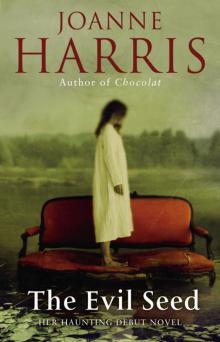 The Evil Seed
The Evil Seed Gentlemen and Players
Gentlemen and Players A Cat, a Hat, and a Piece of String
A Cat, a Hat, and a Piece of String Different Class
Different Class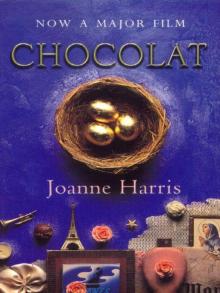 Chocolat
Chocolat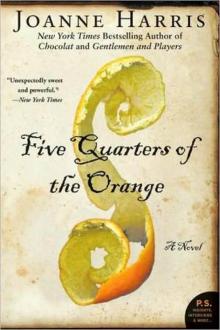 Five Quarters of the Orange: A Novel
Five Quarters of the Orange: A Novel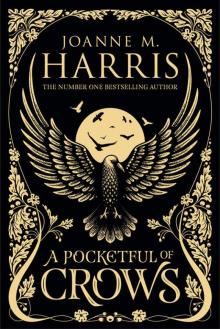 A Pocketful of Crows
A Pocketful of Crows Runelight
Runelight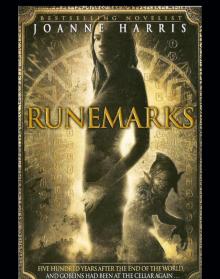 Runemarks
Runemarks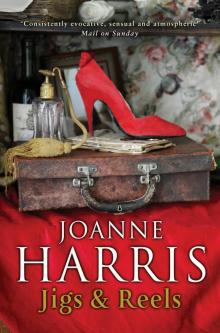 Jigs & Reels: Stories
Jigs & Reels: Stories Sleep, Pale Sister
Sleep, Pale Sister Holy Fools
Holy Fools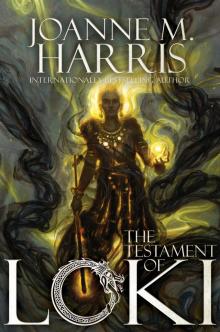 The Testament of Loki
The Testament of Loki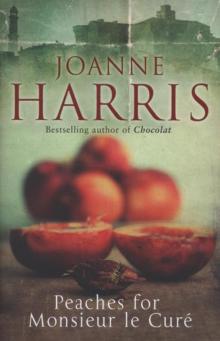 Peaches for Monsieur Le Curé
Peaches for Monsieur Le Curé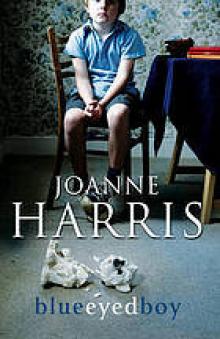 Blueeyedboy
Blueeyedboy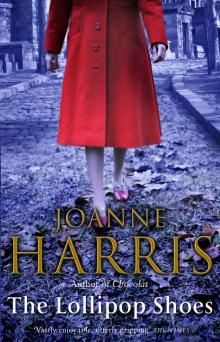 The Lollipop Shoes
The Lollipop Shoes Coastliners
Coastliners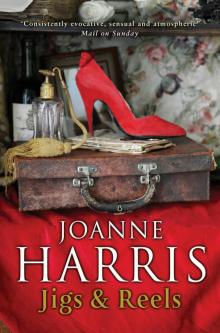 Jigs & Reels
Jigs & Reels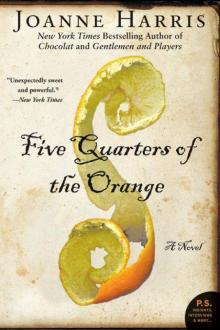 Five Quarters of the Orange
Five Quarters of the Orange